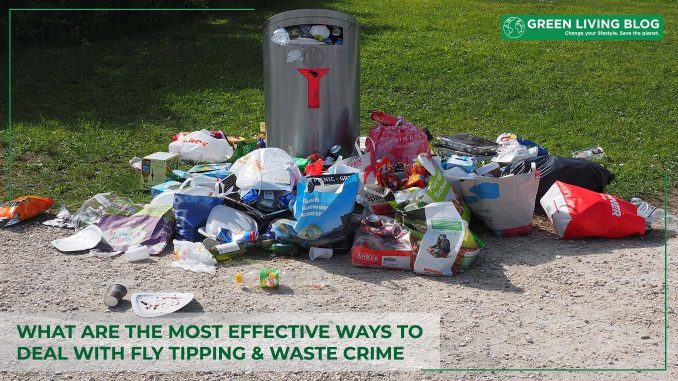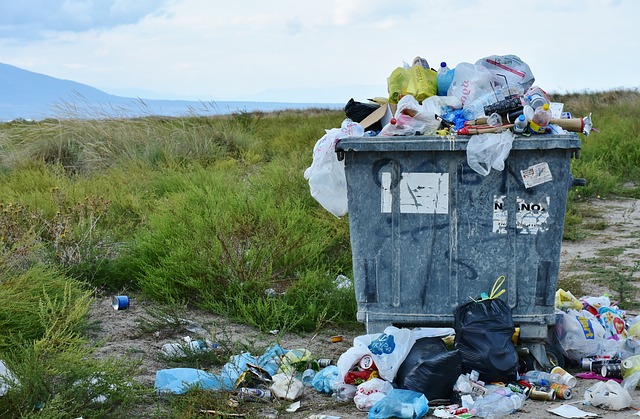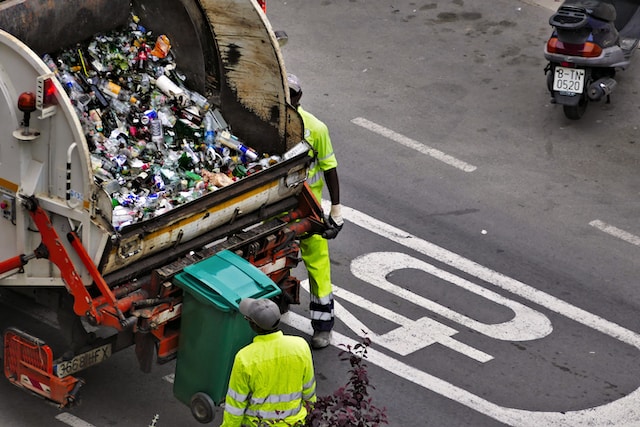
Fly tipping is a serious environmental problem that affects many communities in the UK.
Fly tipping is the illegal dumping of waste on land or water, usually to avoid disposal costs.
It can cause harm to wildlife, pollute water sources, create fire hazards, and spoil the appearance of neighbourhoods.
Why are Fly Tipping & Waste Crime a Big Issue in the UK?

Fly tipping and waste crime pose significant challenges in the UK due to various factors contributing to their prevalence.
Here are some key reasons why they are major issues:
1. Cost of adequate Waste Disposal
The cost of legally disposing of waste, especially bulky or hazardous items, can be substantial. Some individuals and businesses resort to fly-tipping to avoid these costs.
2. Limited Access to Waste Disposal Facilities
Limited access to authorised waste collection and disposal facilities may exist in certain areas, particularly rural or isolated regions. This lack of convenient options can lead to an increase in illegal waste dumping.
3. Illegal Waste Operators
Unlicensed waste carriers or operators who do not follow proper waste management procedures contribute to waste crime. They may collect waste without appropriate documentation and dump it illegally to evade regulatory oversight.
4. The complexity of Waste Regulations
Waste management regulations in the UK can be complex, with various rules and guidelines. This complexity can create confusion and make it challenging for individuals and businesses to comply, leading to non-compliance and potential fly-tipping.
5. Lack of Enforcement and Detection
Fly tipping often occurs in remote areas or at night, making detecting offenders difficult. Limited enforcement resources and challenges in gathering evidence further contribute to the problem.
Data and Statistics help illustrate the Scale of the Issue
 Incidents of Fly Tipping:
Incidents of Fly Tipping:
According to the latest available data from the UK government’s “Fly-tipping in England” report for the year 2019/20, there were approximately 976,000 incidents of fly-tipping reported in England alone. This represents a 2% increase compared to the previous year.
Cost of Clearing Fly Tipping:
The report estimated clearing fly-tipping incidents in England during 2019/20 was around £10.9 million.
Types of Waste Dumped:
Household waste, biodegradable municipal waste, packaging waste, and commercial and industrial waste were the most commonly dumped items, as reported in the “Fly-tipping Statistics for England” from the Department for Environment, Food and Rural Affairs (DEFRA).
Waste Crime Cost:
Waste crime encompasses various illegal activities, including unlawful waste disposal, illegal waste sites, and illegal waste transportation. The Environmental Services Association (ESA) estimates that waste crime costs the UK economy around £1 billion annually.
Impact on the Environment:
Fly tipping and waste crime harm the environment. Hazardous substances and pollutants from illegally dumped waste can contaminate soil, water sources, and ecosystems, posing risks to wildlife and human health.
Public Health Risks:
Improper waste management can lead to public health risks. Accumulated waste can attract vermin and pests, creating breeding grounds for diseases. Burning of waste materials, a common illegal practice, releases toxic fumes that can harm air quality and impact respiratory health.
Social and Community Impacts:
Fly tipping and waste crime have negative social and community implications. Illegal dumping sites can be eyesores and contribute to neglect and disarray in neighbourhoods. They can also deter investment, reduce property values, and diminish residents’ quality of life.
Economic Losses:
The costs associated with fly-tipping and waste crime extend beyond local authorities. Businesses and landowners may face financial losses due to the need for waste removal, site cleanup, and potential damage to their reputation. Additionally, legitimate waste management businesses may face unfair competition from illegal operators.
Hotspots:
Data on fly-tipping incidents often highlights geographic hotspots where the problem is particularly prevalent. Identifying these areas allows local authorities to allocate resources more effectively and implement targeted solutions.
These statistics highlight the urgent need for concerted efforts and effective strategies to combat fly-tipping and waste crime in the UK. By understanding the scale of the problem, policymakers, authorities, and communities can work together to develop targeted solutions and allocate resources to tackle this issue effectively.
Practical Tips to Tackle Fly Tipping and Waste Crime in Your Neighbourhood:

There are different ways to deal with fly tipping, depending on who is responsible for the land or water where the waste is dumped. Here are some of the most effective ways:
● Report it:
If you see someone fly-tipping or find fly-tipped waste, you should report it to your local council or the Environment Agency. They can investigate the incident and take enforcement action against the offenders. You can also report large-scale or hazardous waste to Crimestoppers anonymously.
Ensure that you provide detailed information such as the location, date, time, and description of the waste to assist authorities in promptly identifying and resolving the issue.
● Remove it:
If the fly-tipped waste is on public land or water, such as a highway verge, a river, or a park, the local council or the Environment Agency must remove it and dispose of it properly. If the waste is on private lands, such as a farm or a garden, the landowner is responsible for removing it and may be able to claim costs from the council or the Environment Agency.
Contact the appropriate authorities or seek guidance from your local council on the proper procedures for waste removal.
● Prevent it:
The best way to deal with fly-tipping is to prevent it from happening in the first place. You can do this by following these tips:
● Reduce your waste:
Try to minimise the amount of waste you produce by reusing, repairing, or recycling items whenever possible.
Adopt a conscious approach to consumption, embrace reusable alternatives, and promote recycling initiatives in your community.
● Dispose of your waste legally:
Make sure you use a licensed waste carrier or a registered waste site to get rid of your waste. You can check if a carrier or a site is licensed on the Environment Agency website. You can also use your local council’s bulky waste collection service for larger items.
Be diligent in selecting reputable waste disposal services such as Biffa to ensure proper and legal waste management.
By choosing a reputable waste disposal service like Biffa, you can ensure that your waste is handled following environmental regulations and is disposed of safely and responsibly. This helps to prevent illegal dumping and promotes sustainable waste management practices.
Researching and selecting licensed waste carriers or registered waste sites like Biffa is always a good idea to dispose of your waste legally and responsibly. This way, you can uphold a clean environment and support proper waste management practices.
● Secure your land:
If you own land that is vulnerable to fly-tipping, you can take measures to deter dumpers, such as installing gates, fences, signs, cameras, or lighting.
Implement appropriate security measures to discourage potential fly-tippers from targeting your property.
● Stay Informed:
Stay updated on local waste management regulations and initiatives. Familiarise yourself with the authorised waste disposal facilities, collection schedules, and guidelines provided by your local council. Awareness is key to preventing and addressing waste-related issues.
● Engage with Community Initiatives:
Join or support initiatives tackling fly-tipping and waste crime. Participate in neighbourhood clean-up events or community-led litter-picking activities. Collaborate with local authorities, community groups, and environmental organisations to raise awareness and promote responsible waste management practices.
● Education: Raising Awareness for Responsible Waste Management
Learn about the environmental and legal consequences of fly-tipping and share this information with your friends, family, and neighbours. You can also join or organise campaigns and events to raise awareness and encourage responsible behaviour. For example, Keep Britain Tidy runs an annual campaign called #CrimeNotToCare to educate people about their duty of care when disposing of waste.
Collaborate with local schools, community centres, and organisations to organise educational workshops or talks on fly-tipping and waste management.
● Cooperation: Collaborative Efforts for a Cleaner Environment
Work with your community, local businesses, landowners, and authorities to prevent and tackle fly-tipping. You can join or form groups such as neighbourhood watch schemes, litter-picking teams or environmental action groups that monitor and clean up your area. You can also support initiatives such as reward schemes, CCTV surveillance or signage that deter or detect fly-tippers.
● Collaboration with Online Platforms:
Collaborate with online marketplaces and classified advertisement platforms to tackle the illegal waste trade. Work with these platforms and green apps to enforce policies prohibiting the advertisement and sale of illicit or hazardous waste materials. Encourage responsible waste disposal options and raise awareness among online users about the risks and consequences of participating in unlawful waste activities.
● Encouraging Responsible Business Practices:
Promote responsible waste management practices among businesses and industries. Encourage businesses to use licensed waste carriers, maintain proper documentation, and implement effective waste management systems. Provide guidance and incentives for companies to adopt sustainable practices, reduce waste generation, and increase recycling efforts.
Fly-tipping is not only illegal but also harmful to our environment and our communities. By reporting, removing, and preventing fly-tipping, we can all play a part in tackling this problem and keeping our surroundings clean and safe.
What are the best Solutions to fight Fly Tipping?
Understanding the Gravity of the Issue:
Fly-tipping is the illegal dumping of waste on land or water that does not have a licence to accept it. It is a serious environmental problem that affects the beauty, health, and safety of our communities.
Fly tipping can also cause damage to wildlife, soil, and water quality, and increase the risk of flooding.
The Scale of Fly Tipping in the UK:
According to the latest statistics, there were more than one million incidents of fly-tipping in England in 2016/17, costing over £58 million to clear up. The most common types of waste dumped were household waste, construction and demolition waste, and white goods such as fridges and washing machines.
Fly-tipping is a criminal offence that can result in prosecution, imprisonment, unlimited fines, and confiscation of vehicles used to commit the crime. However, enforcement alone is not enough to deter fly-tippers, who often act in remote areas or at night to avoid detection.
Government Measures and Expert Suggestions:
The UK government and local councils have been actively addressing fly-tipping and waste crime through legislation, enforcement, and collaboration with relevant agencies. Experts in the field emphasise the importance of proactive measures, including:
Local Council Efforts to Tackle Fly Tipping: Learning from London’s Approach
Local councils in the UK play a critical role in tackling fly-tipping and waste crime within their jurisdictions. Let’s take a closer look at how some London councils, such as Newham Council, Hackney Council, Tower Hamlets Council, and Lambeth Council, employ various strategies:
1. Newham Council:
Another Plastic Free tip from our pals at @RecycleFYC and #plasticfreejuly https://t.co/g9LwTIYewg
— Newham Recycles (@NewhamRecycles) July 4, 2022
Newham Council in London actively engages with residents through their Twitter account, @NewhamRecycles, to promote waste management efforts. The account showcases various initiatives for waste reduction, recycling, and environmental sustainability, including awareness campaigns, recycling drives, community events, and educational programs. By highlighting these initiatives, the council aims to inspire and motivate residents to participate in waste management activities and make informed choices about waste disposal.
@NewhamRecycles also provides recycling tips, practical advice on proper waste sorting and disposal, specific material recycling instructions, reminders about the importance of recycling, and suggestions for eco-friendly practices. Additionally, the account keeps residents informed about waste collection services, sharing updates on schedules, procedure changes, and other relevant information to ensure the effective utilisation of available services. The Twitter account is a valuable platform for Newham Council to communicate and engage with the community, encouraging responsible waste management practices.
2. Hackney Council:
ℹ️ Hackney already has one of the highest sustainable travel rates in London, but a quarter of the borough’s CO2 emissions still come from road transport.
🚶♂️🚴🏿♀️🚌 That’s why we’re doing everything we can to encourage people to walk, cycle or use public transport. #COP26 pic.twitter.com/DsK9f8KLz0
— Hackney Council (@hackneycouncil) November 10, 2021
Hackney Council actively engages in waste management and environmental initiatives through their Twitter account, @hackneycouncil. The account serves as a platform to provide updates and information on waste management services and promote responsible waste disposal practices. One of their key focuses is on recycling services, with regular updates on collection schedules and any procedure changes, ensuring residents are well-informed and can effectively recycle their waste.
Additionally, the council actively promotes and highlights community cleanup events in Hackney, encouraging residents to participate and contribute to maintaining a clean and litter-free environment. They also provide guidance and advice on responsible waste disposal, offering tips on recycling materials like plastics, paper, and glass, empowering residents to make informed decisions in managing their waste. Hackney Council’s Twitter account is crucial in engaging the community and fostering a sense of responsibility towards waste management.
3. Tower Hamlets Council:
Let’s keep waste out of the recycling bin #TowerHamlets!
Plastic film, food, nappies, clothes and textiles don’t go in your recycling bin. ❌
For a list of what can and cannot be recycled, visit our website: https://t.co/BZqUZD3lzv pic.twitter.com/1q0KmQcUSW
— Tower Hamlets Council (@TowerHamletsNow) February 2, 2023
Tower Hamlets Council’s Twitter account, @TowerHamletsNow, prioritises recycling and waste reduction efforts. They address fly tipping and waste problems through practical recycling tips, guiding residents on sorting and recycling materials like plastics, metals, and paper. The account also regularly updates waste collection schedules and changes to ensure residents are well-informed about proper waste disposal planning.
Furthermore, Tower Hamlets Council promotes community initiatives focusing on waste reduction and tackling fly-tipping. By highlighting events, campaigns, and projects initiated by local organisations or community groups, they encourage resident participation in creating a cleaner and greener environment. Through active engagement on Twitter, the council promotes responsible waste management practices within the community.
4. Lambeth Council:
On waste and recycling, they also suggest looking at whether a mix of penalties and incentives should be used, especially for organisations who are not acting responsibly.
Flats and housing estates were also highlighted – these need more support to recycle, say the assembly
— Lambeth Council (@lambeth_council) July 3, 2021
Lambeth Council’s Twitter account, @lambeth_council, takes a comprehensive approach to tackling fly-tipping and waste issues. They share information and updates related to waste management initiatives. Recycling schemes, including food waste recycling, garden waste collection, and textile recycling, are highlighted to encourage residents to use these services and divert waste from landfills. The council actively enforces actions against fly-tippers and shares updates to raise awareness and discourage illegal dumping.
Moreover, @lambeth_council showcases success stories and best practices in waste reduction and recycling, inspiring residents to adopt effective waste management strategies from individuals and businesses in the community. Through their platform, the council promotes responsible waste practices and encourages community engagement in creating a cleaner environment.
Through their Twitter accounts, Hackney Council, Tower Hamlets Council, and Lambeth Council actively engage with residents, provide information, and promote initiatives to tackle fly-tipping and waste problems. They emphasise responsible waste disposal, recycling practices, and community involvement to create cleaner and more sustainable neighbourhoods.
Strengthening Legislation and Penalties:
Updating and reinforcing laws and penalties associated with fly-tipping can deter potential offenders and ensure appropriate consequences for those caught in the act.
Targeted Awareness Campaigns: Raising public awareness about the environmental and legal consequences of fly-tipping is crucial. Educational campaigns can highlight the importance of responsible waste management practices and encourage individuals to report instances of illegal dumping.
Motivating Waste Management Initiatives to try:
Litter Lotto: Encouraging Responsible Waste Management
Here’s Grace our latest LitterLotto Champ winning the weekly £1000 Jackpot!
Coventry teen Grace rocks LitterLotto, winning big at just 14! £1000 richer and making a difference.
Make sure you tell everyone and everyone about LitterLotto and join the litter-binning revolution. pic.twitter.com/kaZrF8e6ZM
— LitterLotto (@LitterLotto) June 29, 2023
Litter Lotto is an inspiring initiative that encourages people to take ownership of their waste management habits. By participating in this lottery-based scheme, individuals can earn chances to win prizes by keeping their neighbourhoods clean and free from litter. Such initiatives foster a sense of responsibility and motivate individuals to manage waste effectively.
Recycle Now:
In the UK, #recycling saves about 18 million tonnes of carbon emissions a year, which would be the same as taking 12 million cars off the road.
It’s good to be cautious to avoid #wishcycling, but that shouldn’t stop us from recycling as much as we can 💯https://t.co/PadWtiyARP pic.twitter.com/62qV4bKtd4
— Recycle Now (@recycle_now) June 3, 2023
Recycle Now is a national recycling campaign in the UK. It provides information, guidance, and resources to promote recycling and raise consciousness about the importance of recycling different materials. The campaign offers practical tips on recycling correctly, information on local recycling facilities, and educational resources for schools and communities. Recycle Now aims to motivate individuals to recycle more and make recycling a part of their daily habits.
Refill:
Save money by reusing and #refilling in @TheSun. Download our FREE Refill app to find places near you accepting reusables, including lots offering discounts when you do! #refillrevolution https://t.co/R8VihZqUnO
— Refill HQ (@Refill) June 26, 2023
Refill is an initiative encouraging people to reduce single-use plastic waste by refilling their water bottles instead of buying new ones. The Refill app and website provide a map of refill stations, such as cafes, shops, and public places, where people can refill their water bottles for free. The initiative promotes reusable bottles and aims to make refilling on the go convenient and accessible. By providing easy access to refill stations, Refill motivates individuals to reduce plastic waste and stay hydrated without relying on disposable bottles.
Hubbub Foundation:
Community clean up campaign, join venture by Hubbub UK and Oldham Council, in Westwood Oldham.@JimfromOldham @CllrAbdulJabbar @cllrabdulmalik @marufali786 @JeremyWerneth pic.twitter.com/TszxbahaUv
— Aftab Miah Kahar (@Aftabmiah1) March 24, 2018
The Hubbub Foundation is a charity that designs and delivers creative campaigns to inspire sustainable behaviour and tackle environmental issues, including waste management. They run initiatives such as the “Neat Streets” campaign, which aims to reduce litter in public spaces, and the “Pumpkins Unleashed” campaign, which promotes the recycling of Halloween pumpkins. The Hubbub Foundation uses innovative approaches, collaborations, and community engagement to motivate people to make positive changes in managing waste and contribute to a more sustainable society.
Clean Up Britain:
One of the reasons why no one should pay a waste carrier cash, is to prevent this sort of fly-tip happening.
We support minimum £10,000 fines plus a 12 month driving ban for perpetrators. @adamvaughan_uk pic.twitter.com/72ll8yyMzv— Clean Up Britain (@cleanupbritain) June 30, 2023
Clean Up Britain is a campaign focused on combating litter and promoting cleaner public spaces. They organise various initiatives such as the “Great British Spring Clean” and the “Clean Up Your Commute” campaign. These initiatives encourage individuals, schools, businesses, and community groups to organise cleanup events and take collective action to tackle litter. Clean Up Britain aims to raise awareness about the impact of litter, engage communities, and inspire people to take responsibility for keeping their local areas clean.
Investing in Surveillance Technologies:
Advanced surveillance technologies, such as CCTV systems, can aid in detecting and identifying fly tippers. This can lead to more effective enforcement actions and discourage future instances of fly tipping.
By giving these initiatives and solutions a go, we can all play a part in fighting fly tipping and protecting our environment from this harmful practice.
Conclusion
Fly tipping and waste crime pose significant challenges to the UK’s environmental sustainability and public health. By implementing a comprehensive approach that focuses on prevention, education, reporting, and cooperation, we can collectively combat this problem. By raising awareness, fostering responsible waste management practices, and actively participating in local initiatives, we contribute to a cleaner, safer, and more sustainable future for our communities and the environment we all share.
![]()
Author Profile
- Online Media & PR Strategist
- Blogger and Educator by Passion | Senior Online Media & PR Strategist at ClickDo Ltd. | Fascinated to Write Lifestyle Blogs in News & Education I have completed a journalism summer course at the London School of Journalism and manage various blogs.
Latest entries
 Green Expert GuidesMarch 28, 2025Lisbon Living: Where Sustainable Charm Meets Urban Energy
Green Expert GuidesMarch 28, 2025Lisbon Living: Where Sustainable Charm Meets Urban Energy EnvironmentJanuary 21, 2025Buying Eco-Friendly Homes: 6 Eco Questions to Ask Your Real Estate Agent
EnvironmentJanuary 21, 2025Buying Eco-Friendly Homes: 6 Eco Questions to Ask Your Real Estate Agent BusinessJanuary 16, 202510 Benefits of used Office Furniture when Refurbishing an Office
BusinessJanuary 16, 202510 Benefits of used Office Furniture when Refurbishing an Office Best practicesJanuary 6, 2025Eco-Friendly Event Planning: Mastering Sustainable Waste Management for Holiday Celebrations
Best practicesJanuary 6, 2025Eco-Friendly Event Planning: Mastering Sustainable Waste Management for Holiday Celebrations

 Incidents of Fly Tipping:
Incidents of Fly Tipping:





Leave a Reply
You must be logged in to post a comment.